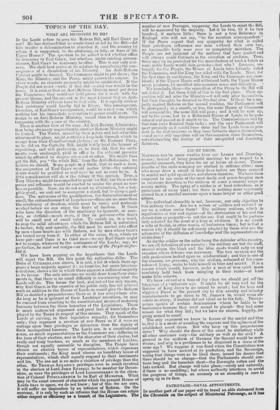COURT DRESS.
NOTHING can be more warlike than our Levees and Drawing- rooms ; instead of being peaceful meetings to pay respect to a peaceful monarch, they have the air of levies en masse. Three- fourths of the male company are clothed in military attire : men who never drew a sword in their lives before are there arrayed in scarlet and gold epaulettes, and cheese-toasters. We have been surprised to see some of the most docile and peace-keeping men in existence flaunting in the uniform of sonic yeomanry corps or county militia. The aping of a soldier is at least ridiculous, as is pretension of every kind; but there is nothing more supremely absurd than a martialCostume upon a tame lawyer or other good citizen.
The individual absurdity is not, however, our only objection to this military show. Are we a nation of soldiers and sailors ? or are we a nation under them ? The military uniform, which is significative of war and rapine—of the destruction of life and the devastation of property—is not the one that ought to be particu- larly selected for the court of a king of civilians. It is no doubt a relic of feudal, in other words, of barbarous times ; but is that a reason why it should be sedulously adopted by those who are the advocates of the diffusion of knowledge and the representatives of ?
As for the soldier or the sailor being the defender of his country, we are all defenders of our country i the military ,are but the staff, around whom the black and the blue coats would rally on any occasion where defence was necessary. The two services are the only professions looked upon as aristocratical ; and this is one of the reasons, we presume, why the civilian, ashamed of his puce- coloured livery, seeks to hide himself in blue and scarlet. It is a reason which would, how-ever, make a man of true spirit more resolutely hold back from mingling in their ranks—at least under false colours.
We have arrived at a time of day when we should put off the trappings of a barbarous age. It might be all very well for the Barons of King JOHN to go armed to court ; but for lean and slippercd Peers of the present day to don cavalry and infantry accoutrements to go down to St. James's in, would seem ab- solute mockery, if custom did not blind us to the folly. Tssucw- DIDES speaks of certain Acarnanians whom he holds to be barbarians because they went armed to plough: they had some reason for what they did ; but we have no reason, happily, for going armed to court. The only argument we know in favour of the scarlet and blue is, that it is a mode of avoiding the expense and the ugliness of the established court dress. But why keep up this preposterous dress ? Why should the dress of the court be stationary while all other costumes vary—the military as well as the civil ? A general in the uniform of GEORGE the Second would be mon- strous; and 'why- is a gentleman to be disguised in a dress of the same acre ? We suppose it was fixed when the Constitution was supposed to have arrived at its perfection, and the Sovereign, seeing that things were as he liked them, issued his decree that there should be no change—that the Parliaments should con- tinue long and the breeches short—the Boroughs rotten and the hats cocked. But change will take place,—easily and naturally, if there is no meddling; but where authority interferes to arrest the progress of things, an anomaly or an absurdity is sure to spring up in its face.


























 Previous page
Previous page